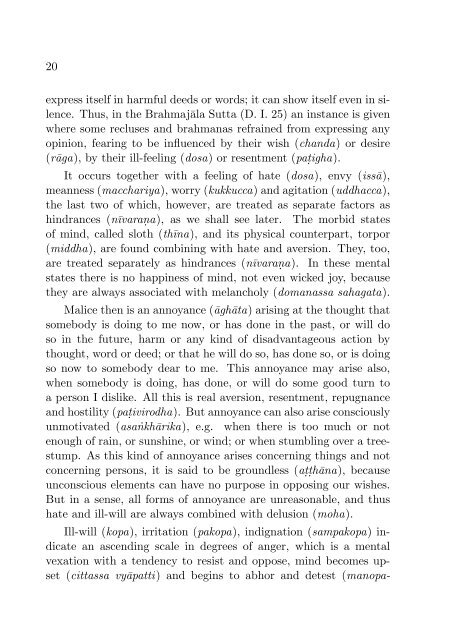Agony and Ecstasy
A comparative study of the five hindrances, together with the five states of concentration or mental absorption.
A comparative study of the five hindrances, together with the five states of concentration or mental absorption.
You also want an ePaper? Increase the reach of your titles
YUMPU automatically turns print PDFs into web optimized ePapers that Google loves.
20<br />
express itself in harmful deeds or words; it can show itself even in silence.<br />
Thus, in the Brahmajāla Sutta (D. I. 25) an instance is given<br />
where some recluses <strong>and</strong> brahmanas refrained from expressing any<br />
opinion, fearing to be influenced by their wish (ch<strong>and</strong>a) or desire<br />
(rāga), by their ill-feeling (dosa) or resentment (paṭigha).<br />
It occurs together with a feeling of hate (dosa), envy (issā),<br />
meanness (macchariya), worry (kukkucca) <strong>and</strong> agitation (uddhacca),<br />
the last two of which, however, are treated as separate factors as<br />
hindrances (nīvaraṇa), as we shall see later. The morbid states<br />
of mind, called sloth (thīna), <strong>and</strong> its physical counterpart, torpor<br />
(middha), are found combining with hate <strong>and</strong> aversion. They, too,<br />
are treated separately as hindrances (nīvaraṇa). In these mental<br />
states there is no happiness of mind, not even wicked joy, because<br />
they are always associated with melancholy (domanassa sahagata).<br />
Malice then is an annoyance (āghāta) arising at the thought that<br />
somebody is doing to me now, or has done in the past, or will do<br />
so in the future, harm or any kind of disadvantageous action by<br />
thought, word or deed; or that he will do so, has done so, or is doing<br />
so now to somebody dear to me. This annoyance may arise also,<br />
when somebody is doing, has done, or will do some good turn to<br />
a person I dislike. All this is real aversion, resentment, repugnance<br />
<strong>and</strong> hostility (paṭivirodha). But annoyance can also arise consciously<br />
unmotivated (asaṅkhārika), e.g. when there is too much or not<br />
enough of rain, or sunshine, or wind; or when stumbling over a treestump.<br />
As this kind of annoyance arises concerning things <strong>and</strong> not<br />
concerning persons, it is said to be groundless (aṭṭhāna), because<br />
unconscious elements can have no purpose in opposing our wishes.<br />
But in a sense, all forms of annoyance are unreasonable, <strong>and</strong> thus<br />
hate <strong>and</strong> ill-will are always combined with delusion (moha).<br />
Ill-will (kopa), irritation (pakopa), indignation (sampakopa) indicate<br />
an ascending scale in degrees of anger, which is a mental<br />
vexation with a tendency to resist <strong>and</strong> oppose, mind becomes upset<br />
(cittassa vyāpatti) <strong>and</strong> begins to abhor <strong>and</strong> detest (manopa-

















